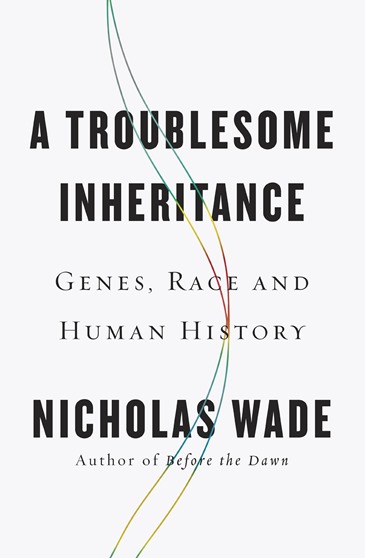Daily Stormer
May 23, 2014

As the mainstream right is being forced to go further towards the real right (also known as the “far right”), Breitbart has published a quite fantastic piece on the reality of race, and the idiocy of the liberal theory that it is a “social construct.”
Most scientists will tell you that race has no biological basis—it is, in academic-speak, a “social construct.” But a new book by distinguished journalist Nicholas Wade challenges that assumption, concluding that race is real and human social behaviour is subject to natural selection just like everything else.
As the New York Review of Books put it, in its coverage of Wade’s A Troublesome Inheritance: Genes, Race and Human History, there is now a “statistical sense” in which races are real. Scientists can tell, based on genetic variance, which continent a DNA sample comes from. That might not sound revolutionary to you, but it’s only recently that we’ve had the computer processing power to do it.
Wade doesn’t shy away from the disquieting implications of his theories: our genes, he says, could explain why some countries are wealthy while others languish in penury. In fact, the more we discover about ourselves from genomics, the more it becomes apparent that science and ideology are on a collision course.
Why? Because it’s totally unacceptable to say in public these days that different races might have different behavioural characteristics, and that those characteristics might be genetically determined… even though that’s the way the science seems to be pointing.
To be fair, it’s easy to understand why researchers get cagey. The all-consuming cult of equality struggles with any suggestion that social behaviours might be genetically determined: that habits and predilections might have diverged along with skin colour. No scientist wants to be responsible for research that justifies crude observations about white sexual mores or black dietary preferences.
It’s one thing to say that tribal cultures have smaller trust circles; quite another to say that science can explain why black people smoke menthol cigarettes, or why Asians are good at maths. (Or, for that matter, why people with ginger hair are less sexually attractive.)
For over a decade, it has been Chinese academics, unencumbered by political correctness, who have embarked upon the race-based research enabled by genomics. The Chinese particularly enjoy IQ-versus-race league tables, because they invariably come out on top. That sort of research makes Westerners squeamish, to put it mildly—which is why today, most research into the genomics of race is still carried out at the Beijing Genomics Institute. By and large, the subject is un-fundable in the West.
Assuming we were to discover biological and behavioural differences attributable to race, does that mean we should start treating different races differently? Could we develop better addiction treatment programs for Native Americans, or more effective medication for Hispanic asthma sufferers?
Unsurprisingly, doctors have already been at this for decades. There are medicines prescribed every day in America targeted at specific racial groups, such as hypertension drug BiDil.
When BiDil was given the nod in 2005, the FDA’s Robert Temple stated plainly: “The information presented to the FDA clearly showed that blacks suffering from heart failure will now have an additional safe and effective option for treating their condition.”
But the pills remain controversial, because they undermine the idea of race as a purely social construct. One female doctor, appalled by the idea of race-based medicine, said in 2005 that she wished BiDil had never been approved, even though she knew it would save lives.
Responses like that are common even today. Nicholas Wade’s résumé is such that critics who find his ideas uncomfortable cannot simply dismiss him as a racist. Indeed, he told the Spectator podcast that only one review of A Troublesome Inheritance so far had done so.
Nonetheless, entrenched hypersensitivities persist. Journalists are often silent—or, worse, resort to name-calling—when they encounter research they find uncomfortable. Ian Steadman, a science writer for the British New Statesman, admitted he had not read Wade’s book when he referred on Twitter to extracts from it as “pretending racism is science.”
“[I’ve] read enough reviews to know what it’s pushing,” he told me later.
Steadman declined to answer further questions, but he did say he has since read A Troublesome Inheritance and intends to review it at some point in the future.
Jason Pontin, publisher of MIT’s Technology Review, wrote yesterday: “I can’t imagine what compelled a science journalist of Nicholas Wade’s stature to take on the subject of race. We don’t know much right now, and while genomics will tell us much more, it can’t yet. For a journalist to go wading speculatively into the subject is asking for career-ending trouble.”
We have known for more than a century that races are intrinsically biologically different (and since we first saw other races, it was obvious by just looking at them), but now we have a situation with genetic science where the Jewish “social construct” line has become so idiotic that no one with any form of self-respect is going to be able to say it with a straight face.
These new genetic discoveries are coming at just the right time, when America is sick of the black president ruling over them and telling them how evil they are, sick of the endless attacks by blacks which become more vicious and widespread every day, sick of being told they are hate-filled “racists” simply because they are fed-up with being invaded by savage hordes.
Everything is coming to a head, and the first cracks of light from a New Dawn are appearing on the horizon.

